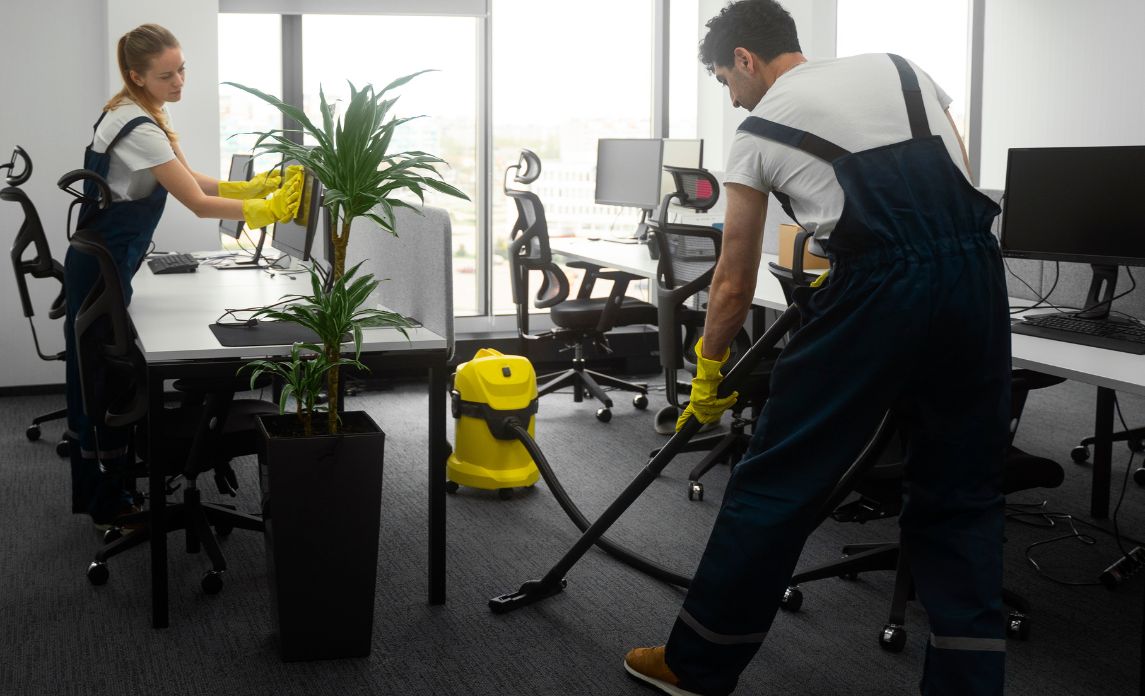In the fast-paced world of business, maintaining a clean and organised workspace is a must. It’s not just about aesthetics either. Rather, it’s a fundamental aspect that can significantly impact the entire organisation’s health, productivity, and success.
While regular cleaning routines contribute to day-to-day tidiness, the importance of deep cleaning cannot be overstated. The latter goes beyond surface-level cleanliness, addressing hidden dirt, contaminants, and neglected areas.This is something that your business should pay attention to, if you haven’t yet.
Cleaning Versus Deep Cleaning
While cleaning and deep cleaning are related concepts, they involve different levels of attention, thoroughness, and the scope of tasks. Here are some general distinctions”
Cleaning
Cleaning is primarily for regular maintenance, involving routine, day-to-day tasks that focus on maintaining a surface-level cleanliness. Key tasks or activities include dusting, vacuuming, sweeping, mopping, and wiping surfaces.
Finally, cleaning is conducted more frequently, often on a daily or weekly basis, to prevent the buildup of dirt and grime.
Deep Cleaning
On the other hand, deep cleaning is a more thorough and intensive process that goes beyond the surface to tackle hidden dirt, grime, and bacteria. It’s more detail-oriented, involving cleaning areas and items that are not part of the regular cleaning routine, such as behind appliances, inside cabinets, baseboards, vents, and other hard-to-reach areas.
Moreover, deep cleaning is typically done less frequently than regular cleaning. Depending on the environment, it may be performed monthly, quarterly, or on an annual basis. Its ultimate goal is to eliminate accumulated dirt and allergens, improve indoor air quality, and address areas that are not regularly cleaned.
Another key difference between the two is that while daily regular cleaning can be performed by non-professionals, deep cleaning is best left to commercial cleaning companies. This way, you can be sure that the job is performed efficiently and thoroughly.
The Benefits of Deep Cleaning
Now that we’ve established the difference between regular maintenance cleaning and deep cleaning, here are a few benefits you can enjoy from the latter.
1. A Healthier Workspace
Deep cleaning plays a pivotal role in creating a healthier workspace by eliminating hidden dust, allergens, and bacteria. Regular cleaning may tackle visible surfaces, but it's the deep cleaning process that reaches into nooks, crannies, and overlooked spaces where germs and contaminants can thrive. This comprehensive approach is essential for reducing the risk of illnesses, allergies, and respiratory issues among employees.
2. Improved Indoor Air Quality
One of the significant benefits of deep cleaning is the improvement of indoor air quality. Over time, dust, allergens, and pollutants can accumulate in carpets, upholstery, and ventilation systems. Deep cleaning removes these contaminants, creating a cleaner and healthier atmosphere. Better air quality can then result in increased employee well-being and productivity.
3. Prevention of Bacterial Growth
Deep cleaning is a key strategy in preventing the growth of harmful bacteria, mould, and mildew. Areas with high moisture levels, such as kitchens and bathrooms, are particularly susceptible to microbial growth. By addressing these areas through deep cleaning, businesses can create a hygienic environment and mitigate the risk of bacterial-related issues
4. Prolonged Asset Lifespan
Business assets, including equipment and machinery, require regular maintenance to ensure longevity. Because deep cleaning goes beyond the superficial, it can address the accumulation of dirt and debris that can contribute to wear and tear. This proactive approach to asset maintenance can result in cost savings by extending the lifespan of equipment.
5. Compliance with Health and Safety Standards
Deep cleaning is not just a matter of making a workplace look presentable. It’s also a crucial component of compliance with health and safety standards. Many industries have regulations in place to ensure the well-being of employees and the public, and deep cleaning helps businesses meet these standards. With a more thorough and systematic approach to hygiene, businesses can reduce the risk of accidents and create a safe working environment.
6. Enhanced Aesthetics and Professional Image
A clean and well-maintained workspace is a reflection of a business’s professionalism, as well as its commitment to health and safety. This can be achieved through deep cleaning, which restores the appearance of surfaces, carpets, and furnishings, contributing to a positive and inviting atmosphere for clients, customers, and employees. This attention to detail enhances the overall image of the business.
7. Employee Well-being and Productivity
A clutter-free and hygienic environment—achieved through deep cleaning—positively influences employee well-being and productivity. Employees are likely to feel more valued and comfortable in a clean workspace, reducing stress levels and contributing to a more positive work atmosphere.
In conclusion, the importance of deep cleaning in businesses extends far beyond mere cleanliness. It is a strategic investment in the health and success of the business, contributing to multiple facets that cover employee well-being, regulatory compliance, positive public perception, and more. By recognising the significance of deep cleaning and integrating it into regular maintenance practices, businesses can create a workspace that fosters health, productivity, and long-term success.


